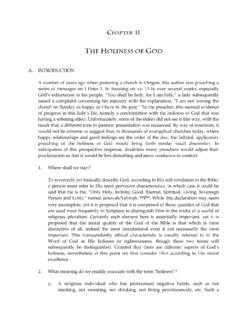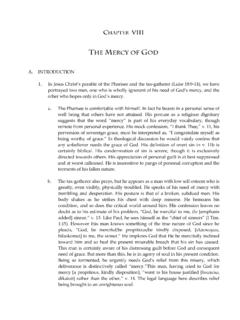Transcription of 04 IV. The Goodness of God update - Bunyan …
1 CHAPTER IV THE Goodness OF GOD A. THE Goodness OF GOD DEFINED 1. Goodness by definition. a. Try to define Goodness apart from the character of God. Of course a moral quality will most likely be a consideration. Though there will probably be some difficulty here if we more loosely refer to mere sentimentality, experience and subjective feeling. Consider the following common ideas. (1) Goodness is the opposite of badness. However, a negative concept does not define a positive concept, though it does help to isolate it. Of course we could immediately ask, What is badness? Certainly this makes more clear that we are considering a matter of ethics and morality. (2) Both Plato and Aristotle considered Goodness to be, the highest end to which knowledge and action lead us. 1 However an objective moral quality seems missing here. With regard to the German philosopher Nietzsche, to be good is to be brave, it is all that increases the feeling of power, the will to power, power itself, in man.
2 2 There is no moral element her, only the upholding of raw human potency. So would this definition establish the highest end, in the realm of sophisticated, high tech larceny, to be good? (3) Good may be associated with pleasure, human happiness, or as one philosopher expresses it, that which is maximally conducive to human happiness. 3 Here the experiential tends to rise above the moral. But would this make the professed bliss of the hedonist or sadist good ? b. According to the Concise Oxford Dictionary, the primary definition of good is, having the right or desired qualities, satisfactory, adequate which suggests a vital moral quality. However the right here recalls the earlier study of 1 Everett F. Harrison, ed., Baker s Dictionary of Theology, p. 253. 2 Will Durant, Outlines of Philosophy, p. 368. 3 William H. Halverson, A Concise Introduction to Philosophy, p.
3 234. THE ATTRIBUTES OF GOD 94 righteousness. So how do the good and the right or righteousness differ? There seems to be a close connection. 2. Goodness by comparison with holiness. a. Recall the two major aspects of God s overall moral being, His holiness. Negative holiness is that which God is wholly set apart from, that is moral impurity or unrighteousness. Positive holiness is that which God is set apart to, that is absolute moral purity intrinsic to himself, or righteousness. Hence righteousness is at the very heart of God s moral being. b. What then is the difference between God s righteousness and His Goodness , and particularly according to biblical definition. (1) In the Old Testament God s righteousness is the totality of His moral being in an absolute, positive and essential sense. So God s Goodness , bOt, t ob, is that which is observed in God s moral being and works with admiration, pleasant moral appreciation, especially by man (Ps.)
4 104:24 28; 119:68; Jer. 31:10 14). However, God saw all that He had made, and behold, it was very good (Gen. 1:31). The Goodness of God is His moral attractiveness which is both satisfying, pleasing, and praiseworthy. Give thanks to the Lord, for He is good; for His lovingkindness is everlasting (Ps. 118:29; cf. 65:4). In the New Testament, the Goodness of God is described by , agathos, meaning essentially good, that is morally dependable, honorable (Mark 10:17 18), and thus morally beneficial and appealing. (2) God s Goodness is His admirable being and doing, but especially His attractive moral excellence, which when expressed actively is defined as His love. God is good, worthy of admiration, and when He morally demonstrates His Goodness ; that is He loves. Goodness is the generic attribute of which the love of benevolence, grace, pity, mercy, forgiveness, are but specific actings, distinguished by the attitude of their objects, rather than by the intrinsic principle.
5 4 (3) Stephen Charnock comments: Goodness is the brightness and loveliness of our majestical Creator. In an active sense it is God s inclination to deal well and bountifully with His creatures. 5 Hence God is morally attractive in both His being and doing. This appeal is experienced by the child of God when his heart, having been renewed, is capable of delighting in righteousness. 4 Robert L. Dabney, Systematic Theology, p. 169. 5 Stephen Charnock, Works, II, pp. 281, 283 4. THE Goodness OF GOD 953. Goodness by comparison with love. a. God s Goodness refers to that observed, attractive moral excellence, that appreciation of His righteousness which the spiritual man especially delights to acknowledge. b. God s love refers to His active Goodness . When God communicates His Goodness to His creation and man in particular, He expresses love.
6 By its very nature, love has a transitive, active quality, that is it must be directed towards an object. This communicated Goodness of God has four distinct aspects which are diagramed So the Triune God is holy in nature, and the admiration of His righteousness, as even contrasted with the unholy heavens (Job 15:15), results in the creature declaring that God is good. When God expresses His Goodness , there is the active manifestation of His love as benevolence, grace, longsuffering, and mercy. THE Goodness OF GOD COMMUNICATED TO HIS CREATURES 6 Louis Berkhof, Systematic Theology, pp. 70 73. Also refer to Charles Hodge, Systematic Theology, I, pp. 427 9; William G. T. Shedd, Dogmatic Theology, I, pp. 385 92. THE ATTRIBUTES OF GOD 96(1) Love as benevolence, or God s welfare to all His creatures and man in particular.
7 44 But I say to you, love your enemies and pray for those who persecute you, 45 so that you may be sons of your Father who is in heaven; for He causes His sun to rise on the evil and the good, and sends rain on the righteous and the unrighteous. (Matt. 5:44 45, cf. Luke 6:27 36; Acts 14:15 17). (2) Love as grace, or God s depth of love directed towards man as an unholy sinner and law breaker. I was formerly a blasphemer and a persecutor and a violent aggressor. Yet I was shown mercy because I acted ignorantly in unbelief; 14and the grace of our Lord was more than abundant, with the faith and love which are found in Christ Jesus. 15It is a trustworthy statement, deserving full acceptance, that Christ Jesus came into the world to save sinners, among whom I am foremost of all. (I Tim. 1:13 15; cf. Rom. 3:24; 5:1 2, 6 8; II Cor. 8:9). (3) Love as longsuffering, or God s patient breadth of love.
8 Or do you think lightly of the riches of His kindness and tolerance and patience, not knowing that the kindness of God leads you to repentance? (Rom. 2:4; cf. 3:25; I Pet. 3:20). And regard the patience of our Lord as salvation; just as also our beloved brother Paul, according to the wisdom given him, wrote to you. (II Pet. 3:15, cf. v. 9). (4) Love as mercy, or God s relieving love to man in distress and agony. 3 Blessed be the God and Father of our Lord Jesus Christ, the Father of mercies and God of all comfort, 4 who comforts us in all our affliction so that we will be able to comfort those who are in any affliction with the comfort with which we ourselves are comforted by God. (Cor. 1:3 4; cf. Ps. 86:14 15). c. By way of illustration, John Hampden Gurney well describes God s observed and active Goodness as follows: Yes, God is good in earth and sky, From ocean depths and spreading wood, Ten thousand voices seem to cry: God made us all, and God is good.
9 The sun that keeps his trackless way And downward pours his golden flood, Night s sparkling hosts, all seem to say, In accents clear, that God is good. THE Goodness OF GOD 97 Yes, God is good, all nature says, By God s own hand with speech endued; And man, in louder notes of praise, Should sing for joy that God is good. For all Thy gifts we bless Thee, Lord, But chiefly for our heavenly food; Thy pardoning grace, Thy quickening word, These prompt our song, that God is good. B. THE Goodness OF GOD ACCORDING TO JESUS CHRIST MARK 10:17 18. A man enthusiastically addressed Jesus Christ as follows, Good teacher, what shall I do to inherit eternal life? To this he was given the reply, Why do you call me good? No one is good except God alone. 1. Goodness as defined by a natural man, v. 17. Clearly this man used the term good in a loose though respectful manner in applying it to Christ.
10 It was more a patronizing approach, an offer of social respect rather than a deep reverential enquiry. Most likely he had heard Jesus before and been impressed. However this man needs to be jolted into thinking about what he had too familiarly spoken about. Many a person today speaks of Jesus Christ without really thinking about what they have said. Jesus often called men to account concerning loose declarations (Matt. 5:33 37; 23:16 22). 2. Goodness as defined by Jesus Christ, v. 18. In responding, Why do you call me good? it is as if Jesus was saying, My friend, do you really understand what you are talking about? Though He does not say, No one is good except the Father. Only then would he have excluded himself as being good. Of course if Jesus is essentially God, as this man fails to perceive, then he ought to be rightly be addressed as good, but only when that perception is genuine and rightly understood.















